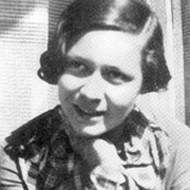Kaprálová Vítězslava
- Year of Birth - Death :
- 1915 - 1940
Biography
Vitezslava Kapralova was born as an only child of composer Vaclav Kapral and singer Viktorie Kapralova, née Uhlirova. Guided by her father, she began to compose at the age of nine. At fifteen she entered the Brno Conservatory where she studied composition with Vilem Petrzelka and conducting with Vilem Steinman and Zdenek Chalabala. She graduated with an award-winning Piano Concerto that she conducted herself. In 1935, she moved to Prague and continued her musical education at the Prague Conservatory, participating in the masterclasses of Vitezslav Novak (composition) and Vaclav Talich (conducting). In 1937, she was offered a French government scholarship to study in France, at the Ecole normale de musique in Paris, and became a student of Charles Munch (1937-1939) and briefly also of Nadia Boulanger (spring 1940). During 1937-39, she also studied composition privately with Bohuslav Martinu, whose Harpsichord Concerto she conducted in 1938 in Paris. Kapralova\'s award-winning Military Sinfonietta, performed in Prague in 1937 by the Czech Philharmonic under her baton, was chosen to open the ISCM Festival in London a year later. At this occasion, Kapralova conducted the excellent BBC Orchestra. Following the German occupation of Czechoslovakia on March 15, 1939, Kapralova decided to stay in exile in France. In April 1940, she married the writer Jiri Mucha. Only two months later, on June 16, 1940, her marriage and musical career were cut short by her tragic death in Montpellier, allegedly from miliary tuberculosis.
Kapralova\'s music was critically acclaimed during her lifetime and continues to be praised by music historians today: \"There is no doubt that had she lived she would have become one of the greatest women composers in Europe\" [Hartog, 1961, 322]. In 1946, in appreciation of her distinctive contribution, the foremost academic institution in the country - the Czech Academy of Arts and Sciences - awarded Kapralova membership in memoriam (she was one of only 10 women members, out of 648 members of the Academy). In 1981, the same institution appraised her work as \"representing a distinctive and progressive moment in the development of Czech music in the first half of the twentieth century\" [Jiranek & Bek, 1981, 268]. In 1999, after the release of the composer\'s landmark CD by Studio Matous, BBC Music Magazine hailed Kapralova as \"a genuinely fascinating voice in inter-war Czech music\" [BBC Music Magazine, June 1999, 92].
Kapralova\'s life and music have inspired two monographs, two novel-biographies, and numerous other works. Her music was published by Baerenreiter, La Sirène Editions Musicales, Editio Supraphon, Editio Praga, Czech Radio Publishing House, HMUB, Melantrich, Svoboda, Pazdirek, and Amos Editio, and released on record by Supraphon and on compact disc by Supraphon, Koch Records, Northeastern Records, Albany Records, Centaur Records, Stylton Records, Studio Matous, Arco Diva, and others.
NB: This is a copy of the text which was originally published at the Kapralova Society (http://www.kapralova.org/LIFE.htm). Provided by courtesy of Karla Hartl, director of the Kapralova Society.
© 2012-2025 Musicbase.cz
Webdesign & hosting Nux Ltd.
Information about web | Sitemap | RSS | Statistics | CMS
Contact information
Music information center, o.p.s.
tel: 257 312 422 | e-mail: his@musica.cz

